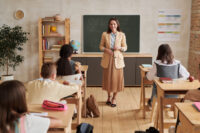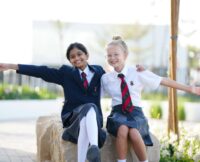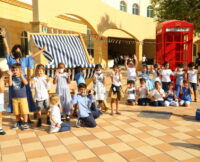Rebecca Howells, Primary Assistant Principal, GEMS Wellington Academy – Al Khail throws light on the impact of early childhood education on students’ future outcomes
As per the statutory framework for the Early Years Foundation Stage (EYFS), “Children develop quickly in the early years, and a child’s experiences between birth and age five has a major impact on its future life chances,”. And indeed, there is much research to attest a link between early years education and positive outcomes achieved by the end of Key Stage 1 (Year 2 of Primary School), particularly with English and Mathematics. There is also evidence of positive longer-term benefits linked to examination performance later.
This begs the question, what is it that children learn during the Early Years that is so impactful on future outcomes?
The EYFS curriculum is shaped by prime and specific areas of learning. While the prime areas include personal, social and emotional development; communication and language; and physical development, the specific areas are literacy, Mathematics, understanding the world and expressive arts and design.
In English curriculum schools, the Early Years educators follow the same pathway into teaching as their colleagues working in Primary. Research carried out by The Education Policy Institute (Dec 2020) has found a positive association between the presence of degree qualified staff, particularly with Qualified Teacher Status, and children’s outcomes at the end of the EYFS.
As part of their teacher training, these teachers experience teaching in different year groups across Primary as well as Foundation Stage, where they specialise. The teachers working in Early Years are trained to support children in reaching the expected level of development at the end of Foundation Stage and possess the wider view of how skills develop in the Primary years.
In EYFS, educators facilitate play-based learning. To the untrained eye, it may seem this is ‘just play’ and any resulting learning is left to chance but this is not the case. The play-based classroom and adjoining outdoor play areas are carefully designed, creating learning spaces which fully support development across the broad EYFS curriculum. Teachers continually observe and assess children’s next steps in learning and create specific objectives which may be the focus for a short period of the day, a whole day or a week or even longer. They then expertly ‘dress’ or resource the play environment to encourage children to engage in play activities that will help meet targeted learning outcomes, which can range from developing early social skills to learning to write in sentences.
Experienced Early Years teachers know when to step in as a ‘play partner’ to scaffold learning, when to help lead the play, and when to stand back to allow children to develop independence and social skills. Teachers may play with children individually or in small groups to move learning forward; this is always personalised to each child’s unique next step in learning. Early Years teachers know that young children also need time to engage in self-led play activities to consolidate basic skills, including social skills, communication, language skills and motor skills.
There will also be times in the day, particularly in Foundation Stage 2, where the teacher leads more formal activities with small groups, or even the whole class – for example, phonics or science lessons. This type of learning supports children’s move to Year 1, while still allowing them to build on their attention and listening skills for a short period of time or in a small group. Where the Early Years setting is part of a primary school, the academic programmes initiated in the Early Years, such as phonics, reading and mathematics programmes, will continue into Year 1, providing seamless progression, consistency and familiarity in learning as children make the transition.
Where children have not attended Early Years education, teachers in Year 1 continue to work with the EYFS curriculum to ensure important milestones are not missed and gaps in learning are filled alongside the demands of the Year 1 curriculum. For example, in the English curriculum, children are expected to read and write sentences by the end of the Early Years stage. Where children have missed this vital aspect of schooling, additional intervention must be in place to ensure new learning is built on strong foundations.








